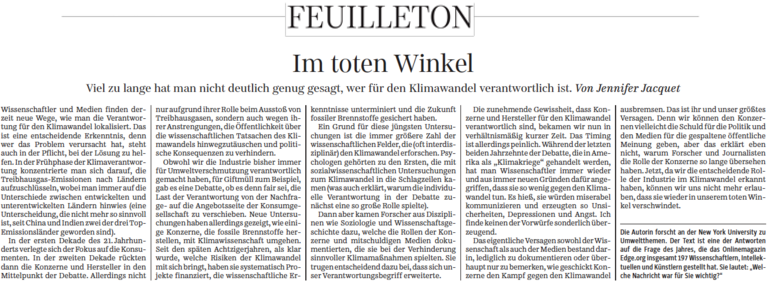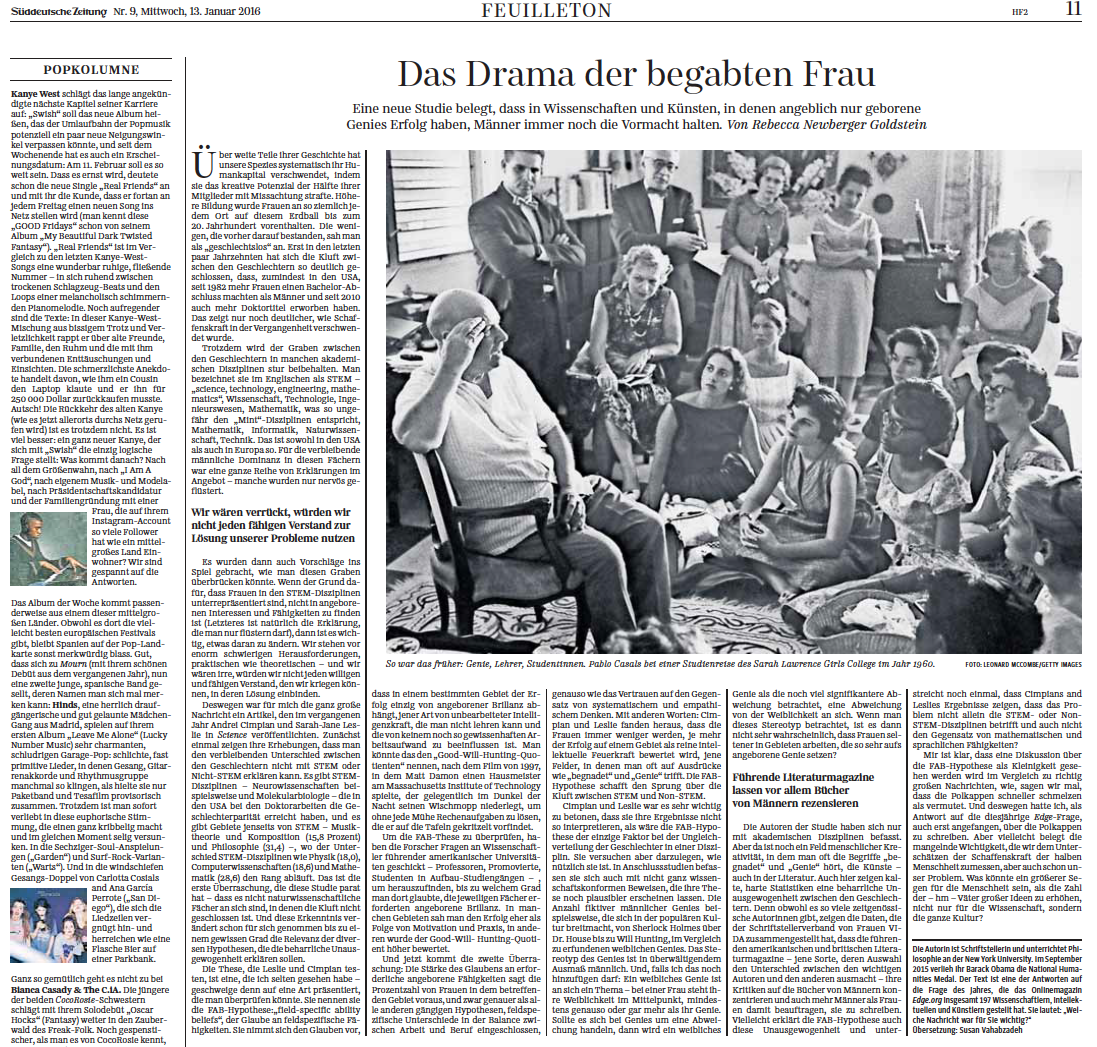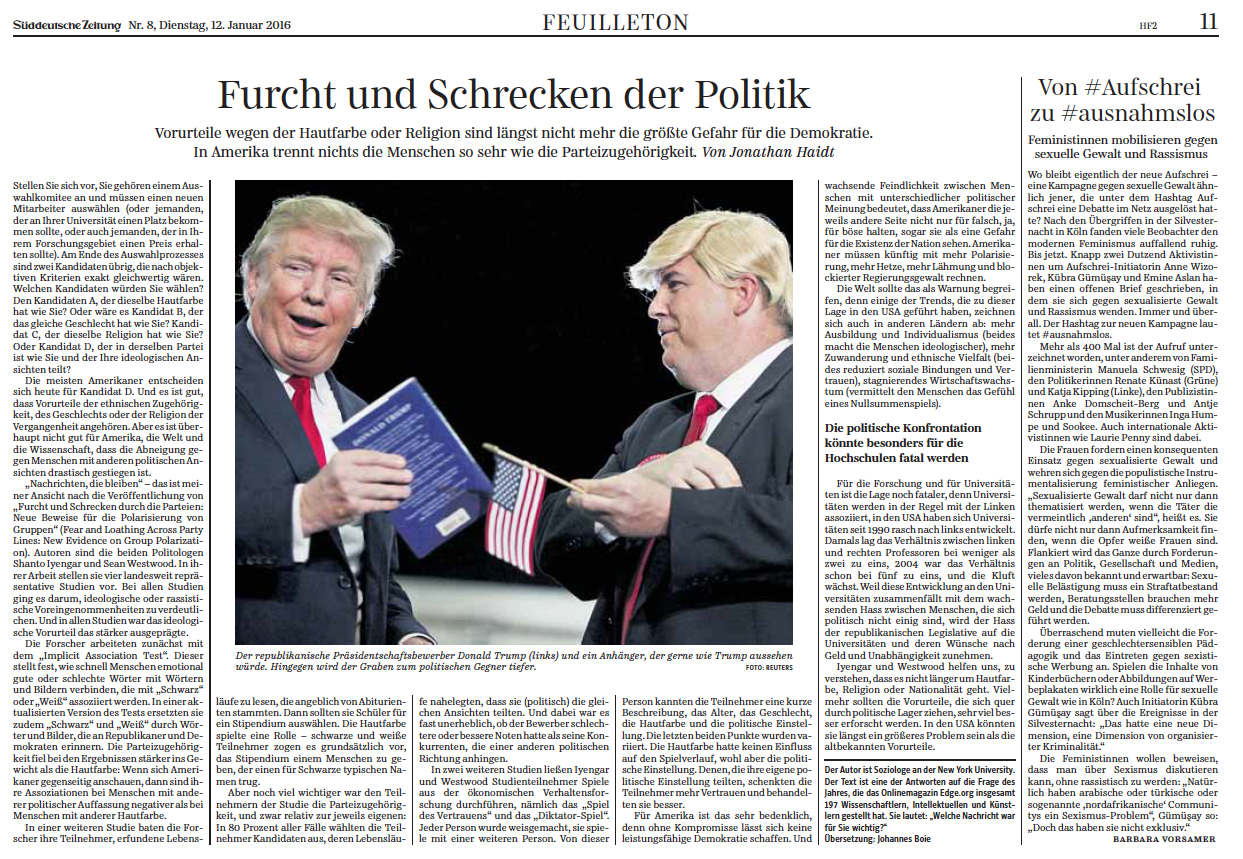Edge in the News

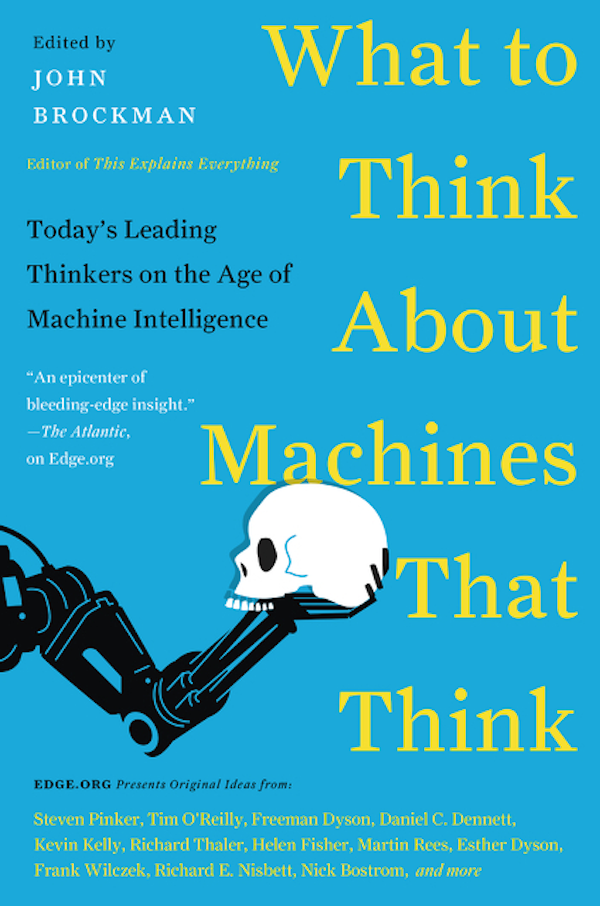 ...[W]ith the culmination of decades of progress in building advanced computing devices and machine learning putting the world on the cusp of true AI, the ground is finally fertile for philosophers, scientists and all manner of other experts and thinkers to jump into the discussion with their own vision of the future of the thinking machine.
...[W]ith the culmination of decades of progress in building advanced computing devices and machine learning putting the world on the cusp of true AI, the ground is finally fertile for philosophers, scientists and all manner of other experts and thinkers to jump into the discussion with their own vision of the future of the thinking machine.
What to Think About Machines That Think is a compilation of incredibly short essays on AI, edited by John Brockman ... literary agent to some of the finest minds of our times. ...
Brockman currently runs the ‘online science salon’ edge.org (which The Guardian once called “the world’s smartest website”). The Edge Question, which he poses every year to his extended network of exceedingly intelligent friends and clients, is a simple, direct question that seeks to push the boundaries of understanding on a burning scientific issue.
Year 2015’s question prompts respondents to ruminate on the potential technological, ethical and even emotional issues that will arise when the first machines start to think independently. ...

Every year, the site Edge.org a question to about 200 people at the research frontiers. Among those surveyed are geneticists, physicists, philosophers, people who work with artificial intelligence, plus the odd wild card, as Kai Krause (maybe someone will remember the wayward landscape modeling program Bryce; it was his work). The questions of the type "What have you changed your opinion about?" Or "What a scientific idea, it is time to retire?" The aim is to provoke thoughtful responses. This year was the question "What is the most interesting scientific news?"
The answers are not always intellectually dope, but together they provide a snapshot of what is going on in the various research fields. What will we learn about in the next few years? Bacteria. The realization that man is dependent on the interaction with bacteria and parasites are breaking through.The bacteria on us and in us control gene activity in our bodies, writes bioantropologen Nina Jablonski. A poorer bacterial flora can lead to obesity, allergies, possibly autism. Perhaps we will soon see ads for bacterial smoothies to everything from obesity to depression.

Theoretical physicist Stephen Hawking is on record about the rising class of technology that can perform almost any conceivable task, from driving us to work to babysitting our children. His dour outlook, expressed to the BBC in 2014: “I think the development of full artificial intelligence could spell the end of the human race.”
Hawking says the primitive AI we’ve known to date — the kind that switches on the air-conditioning before you get home from work — is useful enough. But he fears the next stage, when intelligent, thinking machines can independently improve themselves and begin to determine their own destinies. Will that ability exceed humans’ ability to contain it? What then? Where will humans fit into an AI world? Will the robots have any use for us?
These questions are not so farfetched to the nearly 200 scientists, scholars, artists and public intellectuals who contributed essays for the recently released book What to Think About Machines That Think, edited by John Brockman. Few are as pessimistic as Hawking, but most agree humans should be busy thinking through our future coexistence with the new class of being now under construction. Will they serve us? Will we serve them? Or will we somehow merge into a single, super-being? ...

In 1959 a physicist and English novelist named Charles Percy Snow published a book ... entitled "The Two Cultures"... where humanity itself was crushed between two worlds, on one hand science and on the other humanities.
Several years later, in 1995, an American named John Brockman, interested in the approach of Snow, published the book "The Third Culture" and it raised a new way to understand reality from a holistic approach... to merge the human potential to cleave the truth through scientific culture and humanistic culture. ...

Here’s a question for you:
“What is information and where does it ultimately originate?”
And another:
“Is the universe a great mechanism, a great computation, a great symmetry, a great accident or a great thought?”
The first question was posed by the physicist and writer Paul Davies, the second by John Barrow, a cosmologist, theoretical physicist and mathematician. Both were posted online nearly two decades ago at Edge.org, then a fledgling website created by John Brockman, an author and literary agent for science writers.
Writing back then about Edge and its World Question Center, I concluded: “If a few of those questions don’t get the wheels in the brain spinning, sending some thoughts flying out of the box, nothing will.”
Not long ago I returned to Edge after a few years’ absence and was happy to find it alive and well. The site’s mission remains unchanged: “To arrive at the edge of the world’s knowledge, seek out the most complex and sophisticated minds, put them in a room together, and have them ask each other the questions they are asking themselves.”
One of the site’s top recurring features is the Annual Question. Over the years, scientists and thinkers in a range of disciplines have responded to queries such as these: “What is the most important invention of the last 2,000 years?” (1999); “What questions have disappeared?” (2001); “What do you believe is true even though you cannot prove it?” (2005); “What should we be worried about?” (2013); and “What do you think about machines that think?” (2015).
The question for 2016—“What do you consider the most interesting recent (scientific) news? What makes it important?”—already has drawn nearly 200 responses from contributors ranging from 2004 Nobel Prize-winning physicist Frank Wilczek to musician Peter Gabriel. ...

Nature and nurture are twin words essentially associated with the developmental process of human beings. ... In their 2014 survey of scientists, Alison Gopnik and Edge submit that many respondents wrote that the dichotomy of nature versus nurture has outlived its usefulness, and should be retired. The reason is that in many fields of research, close feedback loops have been found in which “nature” and “nurture” influence one another constantly (as in self-domestication), while in other fields, the dividing line between an inherited and an acquired trait becomes unclear (as in the field of epigenetics or in fetal development). (Edge.org and Gopnik).

What made the father of artificial intelligence so unforgettable was his extraordinary real-life mind
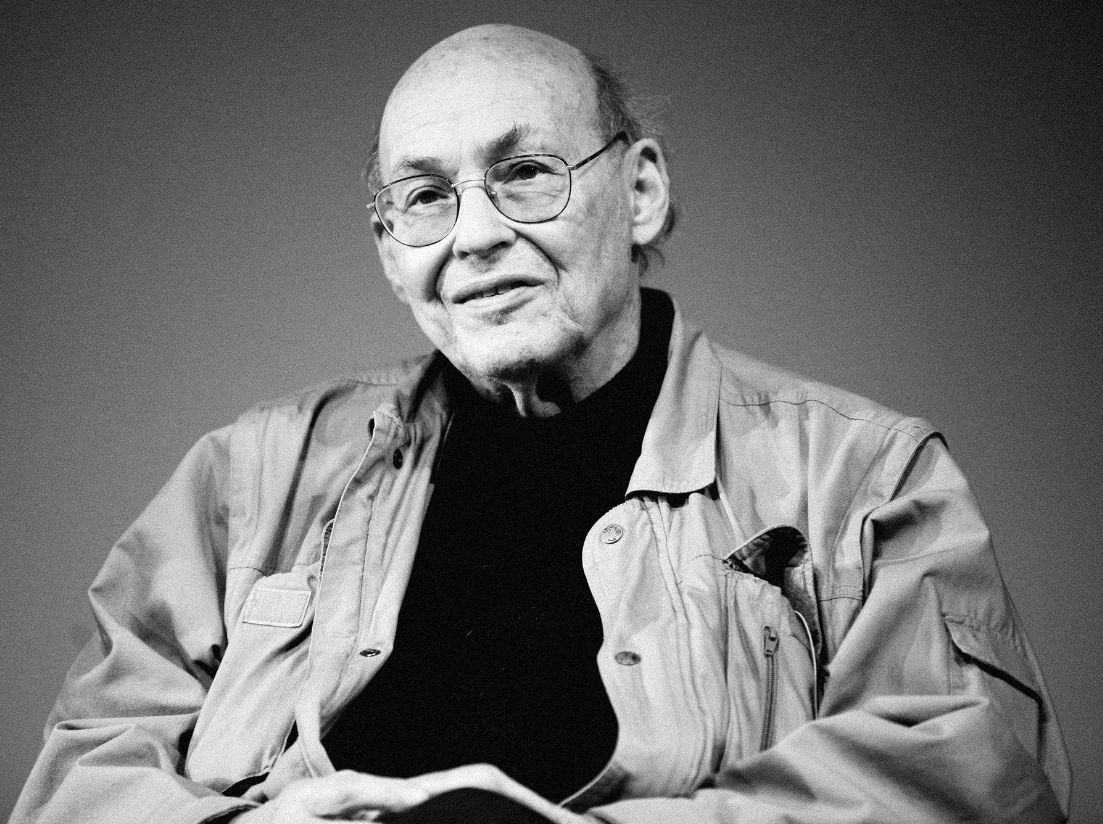
There was a great contradiction about Marvin Minsky. As one of the creators of artificial intelligence (with John McCarthy), he believed as early as the 1950s that computers would have human-like cognition. But Marvin himself was an example of an intelligence so bountiful, unpredictable and sublime that not even a million Singularities could conceivably produce a machine with a mind to match his. At the least, it is beyond my imagination to conceive of that happening.
But maybe Marvin could imagine it. His imagination respected no borders.
Minsky died Sunday night, at 88. His body had been slowing down, but that mind had kept churning. He was more than a pioneering computer scientist — he was a guiding light for what intellect itself could do. He was also our Yoda. The entire computer community, which includes all of us, of course, is going to miss him.
I first met him in 1982 ... I would run into him here and there over the decades. Sometimes, we’d run into each other and talk; other times I’d hear him speak. In 2002, at asummer gathering at the Connecticut farm of Edge.org’s founder John Brockman, a few top scientists were asked to comment on “their universes.” Minsky’s rambling rejoinder was classic:
“To say that the universe exists is silly, because it’s saying that the universe is one of the things in the universe. . . So we have to conclude that it doesn’t make sense to ask about why this world exists. However, there still remain other good questions to ask, about how this particular universe works.” ...
In recent years, whenever Minsky spoke, he would take on a topic and put an astonishing spin to it, whether it was a theory of why people loved musicso much, a stab at determining what made things funny, or a challenging theory of the nature of health. To the last, he was opening minds with his unparalleled meat machine. ...

There is a community called Edge, which publishes non-fiction materials written by scientists. In particular, in recent years it has annually announced "the question of the Year" and the answers to it by leading scientists of the world. The question of 2016 was the following: "What do you think is the most interesting recent scientific news? What makes it important? " In response, 198 scientists participated from different fields ... Each question is carefully thought out ... a sort of voiced firsthand digest of the new learned science ...

From Gene-knives and autistic neurons: The Scholars Association "Edge Foundation" asked well-known researchers, what is revolutionizing the sciences.The result is a fascinating kaleidoscope of new knowledge and methods.
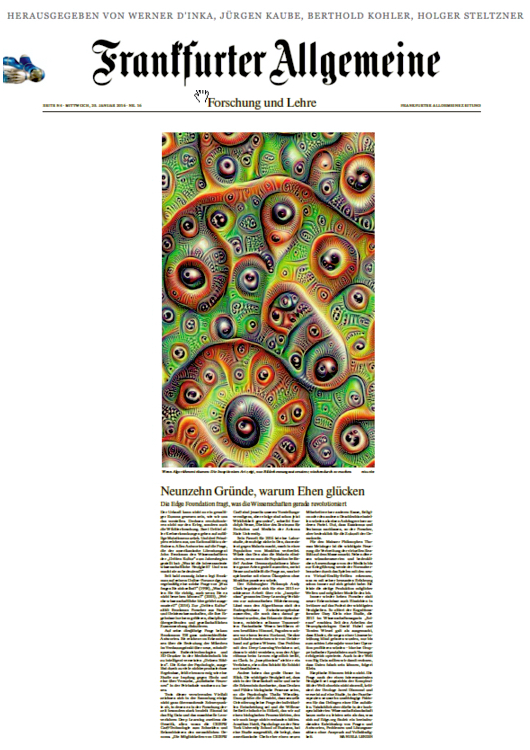
The big bang may not have been such a huge thud, as we imagine. Drones revolutionize not only the war, but also the research on wild animals. Two-thirds of all cancers are due to random mutations. And three principles are sufficient to define rationality. All answers to the question placed before the scientists of the "Third Culture" of American literary agent John Brockman: "What is the most interesting scientific news? And what makes them so important?"
For almost twenty years Brockman puts on his online forum edge.org regularly such a question: "What do you think is right, even if you can not prove it?" (2005), "What do you ask yourself?" (1998), "What is the scientific idea is ready for retirement?" (2014). For "Third Culture" is one of Brockman researchers from natural sciences and humanities, discuss their findings in a larger, multi-disciplinary and social context.
In his this year's question Brockman got 198 very different answers. They range from knowledge about the importance of microbes in the digestive tract of new, resource-saving battery technologies and 3D printers in the medical technology to intelligently networked "green cities". The crisis of psychology, triggered by too many non-reproducible results, just missing a little like a study for vaccination against Ebola and one of the testing, "autistic neurons" to grow in the petri dish. [Continue...]
Read highlighted contributions from: Randolph Nesse, Andy Clark, Thalia Wheatley, Thomas Metzinger, Gary Klein, Jared Diamond.

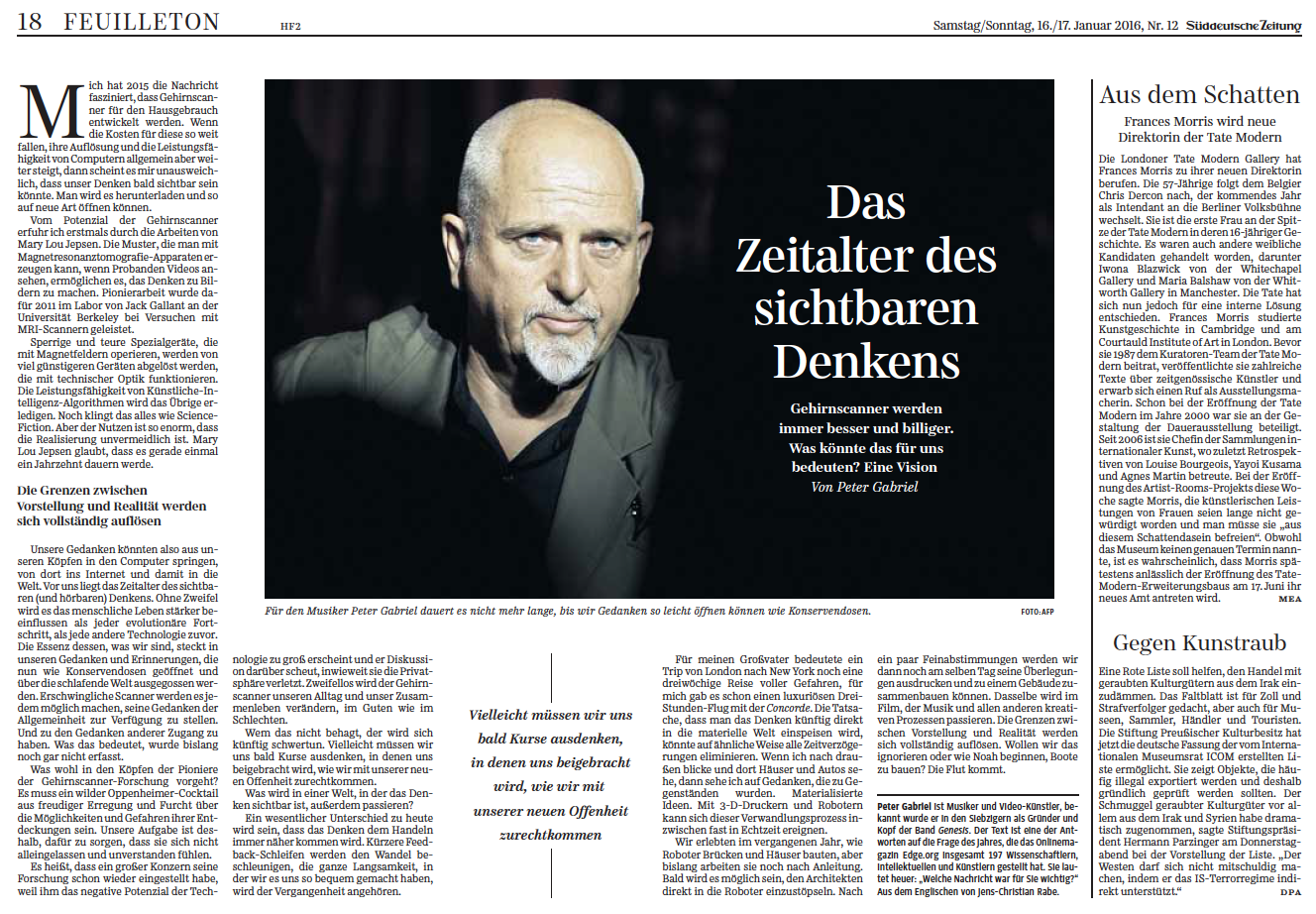
Caption: For musician Peter Gabriel it might not take long until we open our thoughts as easily as a can.
Brain scanners are getting better and cheaper. What could this mean for us? A vision. By Peter Gabriel

Scientists and the media are establishing new ways of looking at who is responsible for anthropogenic climate change. This expanded view of responsibility is some of the most important news of our time because who we see as causing the problem informs who we see as obligated to help fix it. By Jennifer Jacquet

A new study shows that men still hold the power in fields of science and art where supposedly only born geniuses succeed. By Rebecca Newberger Goldstein

Prejudice because of race or religion are no longer the biggest threat to Democracy. In America, nothing divides people so much as the party affiliation. By Jonathan Haidt

An answer to the "Edge" question of the year: "What Do You Consider the Most Important News?": It has never been as good for humanity as it is today. But progress can only continue if one understands it. By Steven Pinker
[ English, Edge.org | German Translation ]
Introduction: The Club of Edgy Thinkers
By Andrian Kreye, Feuilleton Editor, Süddeutsche Zeitung
Edge.org’s question of the year. What has existed on the website for the past twenty years, presented under the banner of the "Third Culture," is ultimately a classical salon in the digital space. In its initial form Edge was already a club of “edgy” thinkers.
Between 1981 and 1996, the "Reality Club" met in New York in pubs, clubs and apartments. Forerunner of Reality Clubs were notable developments. First, a series of dinners in 1965 organized in the kitchen of a New York townhouse where composer John Cage cooked mushrooms for a group of young New York avant-garde artists, holding forth on the ideas of Norbert Wiener (cybernetics), Marshall McLuhan (communication theory), Buckminster Fuller (systems theory), and Norman O. Brown (social philosophy), among others.
During that same time period, Brockman was invited to co-organize a seminar on cybernetics at Massachusetts Institute of Technology between a group of New York artists and those scientists (colleagues of Wiener, who had died the year before) who were pioneers in the field of cybernetics. The aim of such events was to consider ideas scientific ideas and also to have the artists and scientists ask each other the questions they were asking themselves.
When asked, Brockman takes the tradition much further back. One of the first of such circles is the "Lunar Society of Birmingham” at the end of the 18th century. The scientists, industrialists and philosophers who gathered for dinner included Charles Darwin's grandfather Erasmus. Another member was Benjamin Franklin, a scientist and later a founding father of the United States.
Last year we published excerpts from the answers to the 2015 Edge Question "What do you think of machines that think?". The Question this year was: "What Do You Consider the Most Interesting Recent [Scientific] News? What Makes It Important?” Because the open formulation of this year’s question brought so many differing and detailed answers, the Feuilleton Section of SZ is publishing one unabridged text every day this week. The first is written by the cognitive scientist Steven Pinker. This is followed by the social scientist Jonathan Haidt, the philosopher Rebecca Newberger Goldstein, the environmental researcher Jennifer Jacquet, the rock singer Peter Gabriel, the psychologist Gerd Gigerenzer and the behaviorist Michael McCullough. All 197 answers are available on Edge.org in the original English.

What do the United States, Suriname, Papua New Guinea and Tonga have in common?
These countries are among the few worldwide that don't offer paid maternity leave at the federal level for new mothers. ...
In a lovely short essay at Edge.org, psychology professor Linda Wilbrecht, a colleague at UC Berkeley, highlights what we do — and don't — yet know about the impacts of early life experiences on later development. High-quality childcare — whether it comes from mom or other caregivers — and a rich, stable environment could have important downstream consequences for individuals and for society.
Wilbrecht's essay is worth a read...

Nova magazine features contributions from Peter Gabriel, Kevin Kelly, and Bill Joy

Each year, Edge.org editor John Brockman poses a provocative question to a select group of thinkers. For this year’s installment, nearly 200 brainy contributors were asked: “What do you consider the most recent scientific news?” Here’s what they had to say.
As Brockman notes, “We now live in a world in which the rate of change is the biggest change.” Science, therefore, has “become a big story, if not the big story: news that will stay news.” But given the insane amount of science-related news that makes the rounds on a daily basis, it’s not immediately clear which sciency tidbits are the ones we should be focused on.
To help him parse through this staggering amount of science—and to provide a 50-foot perspective on where we are right now—Brockman recruited some of the biggest names in science, technology, art, and philosophy. Contributors included Martin Rees, Steven Pinker, Gloria Origgi, Freeman Dyson, Max Tegmark, Judith Rich Harris, Peter Gabriel, Nina Jablonski, Bill Joy, Michael Shermer, Kevin Kelly, Gregory Benford, Sean Carroll, Frank Tipler, Steve Omohundro, and many, many others. ...
Online Thinkers forum frontier (Edge.org) since 1998, has put forward thought-provoking topics every year, such as '98: What questions are you asking yourself?; '99: What is the most important invention in the past 2,000 years?; 2006: What is your dangerous idea?; Last year: What do you think about machines that think? This year, editor John Brockman, got nearly 200 thinkers: What do consider the most interesting recent [science] news? What makes it so important?
As a result, 198 experts from physics, astronomy, psychology, archeology, biology, history, computer science, etc. each wrote an essay, including Steven Pinker, Peter Gabriel, Nina Jablonski, Bill Joy, Michael Shermer, Kevin Kelly, Gregory Benford, George Church. ... Several hot topics ran as expected, including research cancer and other diseases, pollution, genetic research, artificial intelligence, quantum physics and gravity research, to find Earth 2.0 and extraterrestrial life. ...


At the end of every year, Edge reaches out to the smartest people on the planet and asks them a single question in an attempt to find the ideas and concepts that are changing the world of science. This year’s two-part question was: “What do you consider the most interesting recent [scientific] news? What makes it important?”
Not surprisingly, this year’s set of 197 responses converged around a few key themes – the human brain, the human genome, space exploration and artificial intelligence. Based on these responses, here are 10 of the edgiest innovation buzzwords that have the greatest potential to change the trajectory of innovation in 2016. ...
Read highlighted contributions from: Max Tegmark, George Dyson, Melanie Swan, Christian Keysers, Abigail Marsh, Kevin Kelly, W. Tecumseh Fitch, Stewart Brand, Thomas Metzinger, and Mark Pagel.

It is time once again for the Edge Annual Question, a mind-bending and boundary-busting online convening of scientists, technologists, and other big thinkers all responding to a single question at the intersection of science and culture. From physicists to artists, cognitive psychologists to journalists, evolutionary biologists to maverick anthropologists, these are people who Edge founder, famed literary agent, and BB pal John Brockman describes as the "third culture (consisting) of those scientists and other thinkers in the empirical world who, through their work and expository writing, are taking the place of the traditional intellectual in rendering visible the deeper meanings of our lives, redefining who and what we are."
This year, John asked: What do you consider the most interesting (scientific) news? What makes it important?" Nearly two hundred really smart people responded, including Steven Pinker, Nina Jablonski, Freeman Dyson, Stewart Brand, Marti Hearst, Philip Tetlock, Kevin Kelly, Lisa Feldman Barrett, Douglas Rushkoff, Lisa Randall, Alan Alda, Jared Diamond, Pamela McCorduck, and on and on.



